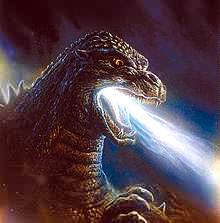
The "Godzilla" movies we knew growing up were amusing for their bad special effects, caricatures of Japanese behavior, bad scripts, and bad acting all around.
Somewhere in my life, re-seeing the movies (I guess in the 80's) I figured out what they were really about: in a nation that had been devestated by war, for the first time in its history occupied by a foreign power, the safest way for Japan to express its horror at the destruction and impotence visited upon it (as a result of its imperialism, of course) was to use an allegory. The New York Times has finally figured out this with a penetrating glance into what I'd say is the obvious:
A fire-breathing reptile is pretty much the same in any language. But the butchered version of the film that swept the world after release in the United States was stripped of the political subtext - and the anti-American, antinuclear messages - that had saturated the original. The uncut version of the film is due out on home video early next year, and should push serious Godzilla fans to rethink the 50-year evolution of the series. It should also show them that they were hoodwinked by the denatured Americanized version that dominated many of their childhoods in the late 20th century. At the same time, Godzilla fans are on the edge of their seats about a new film that should be released in the United States soon.
The original "Gojira" was never intended as a conventional monster-on-the-loose movie. Nor did it resemble the farcical rubber-suit wrestling matches or the domesticated movies (with Godzilla cast as a mammoth household pet) that the series degenerated into during the 1960's and 70's.
As the historian William Tsutsui reminded us in last year's cult classic, "Godzilla on My Mind," the 1954 movie was a dark, poetic production that dealt openly with Japanese misgivings about the nuclear menace, environmental degradation and the traumatic experience associated with World War II.
No sh*t, Sherlock.
What is even more interesting about the uncut version of the movie coming out is that it coincides with the re-emergence of Japan as a military power in its own right; one wonders what kind of monster would be depicted to represent China, and who would fight whom where.
No comments:
Post a Comment